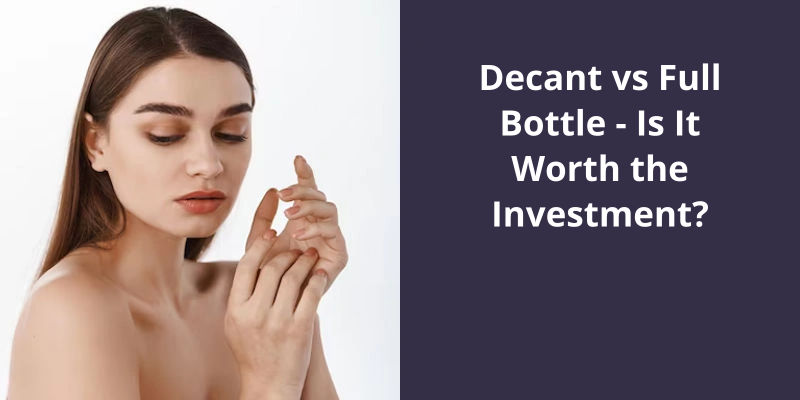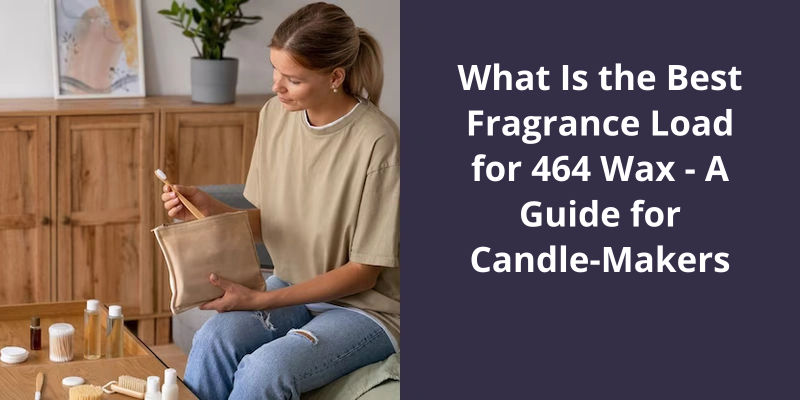Decants and full bottles both have their own worth, depending on a person’s specific needs. Decants are smaller quantities of perfume, usually sold in simple packaging, offering a more economical way to test various fragrances without committing to a full bottle. This makes it ideal for those who like to experiment with their fragrance or those who only wear perfume on special occasions. On the other hand, full bottles are usually more costly but provide a greater amount of perfume and come in brand-specific, often luxurious, packaging. This makes them a good investment for those who have a signature scent, wear perfume daily, or wish to display the bottle for aesthetic purposes. Therefore, whether a decant or a full bottle is worth the investment depends on your perfume-wearing habits.

What Is the Advantage of Decant Perfume?
Decanting perfume is a process where you transfer fragrance from one bottle to another. Some people decant perfume to create smaller, more portable bottles of their favorite fragrances. Whatever your reason for decanting, there are several benefits to this process that make it worthwhile.
Buying full-sized bottles of perfume can be expensive, especially if you want to try out a variety of scents. This is especially useful if you like to switch up your scents frequently.
This is especially useful when you’re traveling by plane and need to adhere to strict liquid restrictions.
How to Decant Perfume Properly
To decant perfume properly, first select a clean and dry glass bottle with a tight-fitting lid. Remove the original perfume bottle cap and insert a funnel into the glass bottle. Pour the perfume slowly and carefully into the funnel until the glass bottle is about two-thirds full. Carefully remove the funnel and seal the lid tightly on the glass bottle. Label the glass bottle with the name of the fragrance and date of transfer. Store the glass bottle in a cool, dark place away from direct sunlight or heat.
Determining the appropriate number of sprays for a 10 ml decant can be a tricky affair, especially for those new to fragrance application. While there’s no one-size-fits-all approach, it’s essential to strike a balance between enjoying the scent and avoiding wastage. Therefore, in this article, we discuss practical tips to help you achieve the right number of sprays for longevity, sillage, and cost-effectiveness.
How Many Sprays for 10 Ml Decant?
When it comes to fragrances, one important aspect to consider is how many sprays are necessary for a specific decant size. This is because the number of sprays required can greatly affect how long a fragrance will last and how evenly it will be dispersed on the skin. For a 10ml decant, the approximate number of sprays needed is around 143-145.
Similarly, factors such as skin type and climate can also have an impact on how a fragrance performs.
When spraying a fragrance, it’s best to aim for even distribution across the skin. This ensures that the fragrance is evenly dispersed and avoids any patchiness or uneven scent strength. Spraying from a distance of around 12 inches is a good rule of thumb, although this too may vary depending on the fragrance and application method.
Those who’re new to fragrances may find it helpful to experiment with different numbers of sprays to find what works best for them.
By taking the time to experiment and find what works best, one can enjoy the full potential of their favorite fragrances on a daily basis.
How to Store Fragrance Decants to Maintain Longevity and Potency
- Keep fragrances in a cool, dark place away from heat and light.
- Avoid storing fragrances in the bathroom where humidity can affect potency.
- Store fragrances in their original packaging or in opaque, airtight containers.
- Label decants with the name of the fragrance and date of decanting.
- Avoid exposing fragrances to air by keeping lids tightly closed.
- Rotate fragrances regularly to prevent them from sitting untouched for too long.
Now that we know the process of decantation and the fact that it’s irreversible, let’s explore how long a decanted wine can last. As much as we love the depth of flavor and aroma that comes with decanting, it’s important to note that it’s benefits are temporary. In fact, most red wines last just 12-18 hours after being decanted before they start to lose their potency. So if you plan on enjoying a decanted wine, it’s best to drink it sooner rather than later.
How Long Does a Decant Last?
This means that if youve opened a bottle of wine and decided to decant it, youll want to drink it fairly quickly, ideally within that same day or evening. It’s worth noting that the type of wine youre decanting can also affect it’s lifespan. For example, a young, bold, tannic red wine might last a bit longer than a delicate, older bottle.
One thing to consider when deciding to decant a wine is what you hope to achieve. Decanting can help to aerate the wine, which can help to soften it’s tannins and open up it’s aromas and flavors. This can be particularly helpful if youre drinking a young, tight wine that needs time to breathe. The decanter also separates any sediment that may have formed in the bottle, ensuring that you pour only the clear, smooth wine into your glass.
It’s important to store your decanted wine properly to help preserve it’s flavor for as long as possible. A cool, dark place, away from direct light and heat, is ideal. If you won’t be drinking the wine immediately, consider putting it in the fridge to keep it fresh. However, be aware that chilling a wine can also mute it’s flavors, so take it out of the fridge and let it warm up a bit before serving.
One is to transfer the wine back to the original bottle and seal it tightly with a cork or wine stopper. This will help to slow down the process of oxidation, which can cause the wine to spoil. You may also want to consider using a vacuum pump to remove any excess air from the bottle, which can also help to preserve the wine.
Knowing how long a fragrance decant will last can be helpful in determining whether or not to purchase a certain size or concentration. With a range of sprays per bottle, different sizes and concentrations can vary in longevity. Let’s take a closer look at the estimated lifespan of a 10mL decant.
How Long Will 10mL Decant Last?
The longevity of a fragrance largely depends on it’s volume, concentration, and frequency of use. A decant, which refers to a small vial or bottle containing a portion of a larger fragrance bottle, is a common way to sample or carry smaller amounts of a scent. The longevity of a 10mL decant can vary based on the factors mentioned above, with the concentration of the fragrance being a particularly important factor.
Eau de Cologne (EDC), which has a lower concentration of fragrance oils, generally lasts for the shortest time period. A 10mL EDC decant bottle can provide between 100-150 sprays, which translates to around 25-37 days of use, assuming 3-4 sprays per day. However, if the fragrance is applied more lightly or less frequently, the decant may last longer.
On the other hand, a 10mL decant of a more concentrated fragrance, such as an Eau de Parfum (EDP), can provide a longer-lasting fragrance experience. EDPs typically have a higher concentration of fragrance oils, and as a result, require fewer sprays to achieve the desired scent intensity.
Additionally, the size of the spray nozzle and the intensity of the spray can impact the number of sprays per use. A smaller nozzle may dispense less fragrance per spray, while a more intense spray can use up more fragrance in fewer sprays.
Overall, a 10mL decant can last approximately 25-37 days for an EDC and 30-40 days for an EDP, assuming regular use and appropriate storage conditions. However, it’s important to keep in mind that individual usage patterns and preferences will ultimately determine the longevity of a decant.
Factors That Affect Fragrance Longevity
- Concentration of fragrance oils
- Type of fragrance oils used
- Percentage of natural ingredients
- Storage conditions
- Skin type and pH
- Ambient temperature and humidity
- Application technique
- Top, middle, and base notes
- Clothing fabrics and colors
- Chemical reactions with other products
Conclusion
However, it’s important to note that improper decanting or storage can actually negatively impact the wine's quality and taste. Ultimately, the key is to understand the wine you’re dealing with and make an informed decision based on your own taste and preferences.





